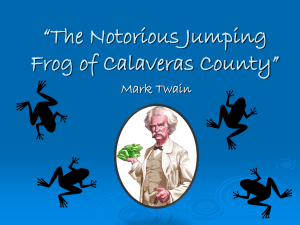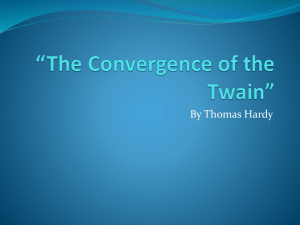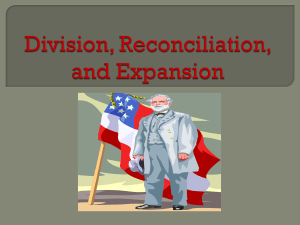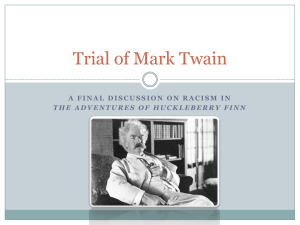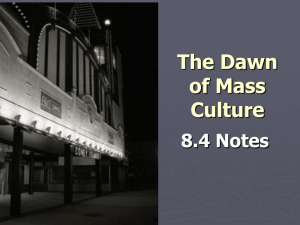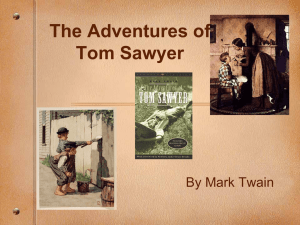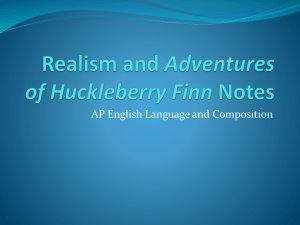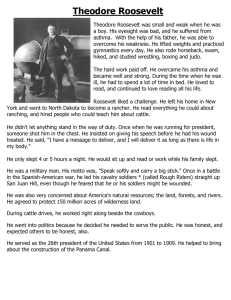The Lowest Animal
advertisement
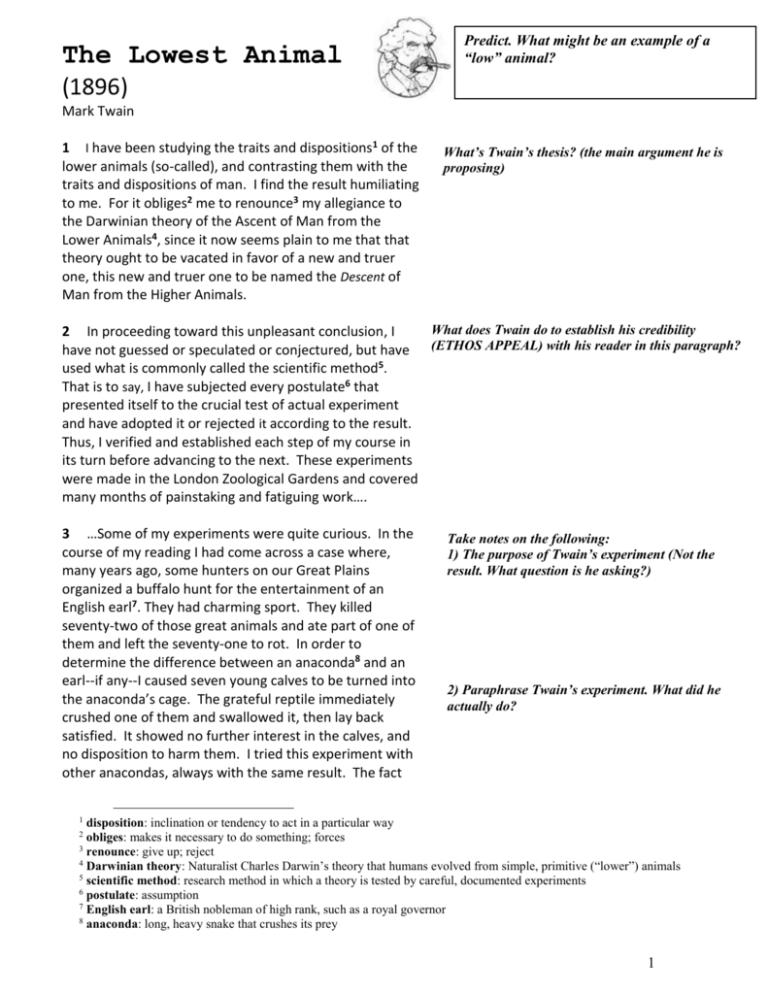
The Lowest Animal Predict. What might be an example of a “low” animal? (1896) Mark Twain 1 I have been studying the traits and dispositions1 of the lower animals (so-called), and contrasting them with the traits and dispositions of man. I find the result humiliating to me. For it obliges2 me to renounce3 my allegiance to the Darwinian theory of the Ascent of Man from the Lower Animals4, since it now seems plain to me that that theory ought to be vacated in favor of a new and truer one, this new and truer one to be named the Descent of Man from the Higher Animals. What’s Twain’s thesis? (the main argument he is proposing) What does Twain do to establish his credibility 2 In proceeding toward this unpleasant conclusion, I have not guessed or speculated or conjectured, but have (ETHOS APPEAL) with his reader in this paragraph? used what is commonly called the scientific method5. That is to say, I have subjected every postulate6 that presented itself to the crucial test of actual experiment and have adopted it or rejected it according to the result. Thus, I verified and established each step of my course in its turn before advancing to the next. These experiments were made in the London Zoological Gardens and covered many months of painstaking and fatiguing work…. 3 …Some of my experiments were quite curious. In the 1. course of my reading I had come across a case where, 2. many years ago, some hunters on our Great Plains organized a buffalo hunt for the entertainment of an English earl7. They had charming sport. They killed seventy-two of those great animals and ate part of one of them and left the seventy-one to rot. In order to determine the difference between an anaconda8 and an earl--if any--I caused seven young calves to be turned into 3. the anaconda’s cage. The grateful reptile immediately crushed one of them and swallowed it, then lay back satisfied. It showed no further interest in the calves, and no disposition to harm them. I tried this experiment with other anacondas, always with the same result. The fact 4. Take notes on the following: 1) The purpose of Twain’s experiment (Not the result. What question is he asking?) 2) Paraphrase Twain’s experiment. What did he actually do? 1 disposition: inclination or tendency to act in a particular way obliges: makes it necessary to do something; forces 3 renounce: give up; reject 4 Darwinian theory: Naturalist Charles Darwin’s theory that humans evolved from simple, primitive (“lower”) animals 5 scientific method: research method in which a theory is tested by careful, documented experiments 6 postulate: assumption 7 English earl: a British nobleman of high rank, such as a royal governor 8 anaconda: long, heavy snake that crushes its prey 2 1 stood proven that the difference between an earl and an anaconda is that the earl is cruel and the anaconda isn’t; and that the earl wantonly9 destroys what he has no use for, but the anaconda doesn’t. This seemed to suggest that the anaconda was not descended from the earl. It also seemed to suggest that the earl was descended from the anaconda, and had lost a good deal in the transition. 4 I was aware that many men who have accumulated Based on the results of his experiment, paraphrase Twain’s conclusion. In paragraph 4, what specific details make us suspect this more millions of money than they can ever use have may be satire? What seems funny or not-so-scientific 10 about Twain’s description of the “subjects” of his shown a rabid hunger for more, and have not scrupled experiment? to cheat the ignorant and the helpless out of their poor 11 servings in order to partially appease that appetite. I furnished a hundred different kinds of wild and tame animals the opportunity to accumulate vast stores of food, but none of them would do it. The squirrels and bees and certain birds made accumulations, but stopped when they had gathered a winter supply, and could not be persuaded to add to it either honestly or by chicane12. In order to bolster up a tottering reputation, the ant pretended to store up supplies, but I was not deceived. I know the ant. These experiments convinced me that there is this difference between man and the higher animals: he is avaricious13 and miserly14; they are not. 5 In the course of my experiments I convinced myself Paraphrase the main idea of this paragraph that among the animals man is the only one that harbors15 insults and injuries, broods over them, waits till a chance offers, then takes revenge. The passion of revenge is unknown to the higher animals. 6 Roosters keep harems16, but it is by consent of their concubines17; therefore, no wrong is done. Men keep harems but it is by brute force, privileged by atrocious laws which the other sex was allowed no hand in making. In this matter man occupies a far lower place than the rooster. By comparing man to roosters, what specific flaws in human behavior is Twain highlighting? (Focus on how we are different from roosters) 7 Cats are loose in their morals, but not consciously so. Man, in his descent from the cat, has brought the cats looseness with him but has left the unconsciousness 9 By comparing humans to cats, what flaw in human behavior is Twain exposing? wantonly: shamelessly scrupled: hesitated because of feelings of guilt 11 appease: satisfy 12 chicane: cheat someone 13 avaricious: greedy; materialistic 14 miserly: stingy; penny-pinching; tight-fisted 15 harbors: privately keeps something in mind 16 harem: a group of women or wives to engage with, including sexually 17 concubine: mistress; lover 10 2 behind--the saving grace which excuses the cat. The cat is innocent; man is not. 8 Indecency, vulgarity, obscenity---these are strictly In your own words, describe the flaw in human behavior confined to man; he invented them. Among the higher Twain is exposing. animals there is no trace of them. They hide nothing; they are not ashamed. Man, with his soiled mind, covers himself. He will not even enter a drawing room with his breast and back naked, so alive are he and his mates to indecent suggestion. Man is The Animal that Laughs. But so does the monkey, as Mr. Darwin pointed out, and so does the Australian bird that is called the laughing jackass. No--Man is the Animal that Blushes. He is the only one that does it--or has occasion to. 9 …Of all the animals, man is the only one that is cruel. By comparing us to cats, what point is Twain making He is the only one that inflicts pain for the pleasure of about the motives for human cruelty? doing it. It is a trait that is not known to the higher animals. The cat plays with the frightened mouse; but she has this excuse, that she does not know that the mouse is suffering. The cat is moderate--inhumanly moderate: she only scares the mouse, she does not hurt it; she doesn’t dig out its eyes, or tear off its skin, or drive splinters under its nails) man--fashion; when she is done playing with it, she makes a sudden meal of it and puts it out of its trouble. Man is the Cruel Animal. He is alone in that distinction. 10 The higher animals engage in individual fights, but never in organized masses. Man is the only animal that deals in that atrocity of atrocities, War. He is the only one that gathers his brethren18 about him and goes forth in cold blood and with calm pulse to exterminate his kind. He is the only animal that for sordid19 wages will march out, as the Hessians20 did in our Revolution, and as the boyish Prince Napoleon did in the Zulu war21, and help to slaughter strangers of his own species who have done him no harm and with whom he has no quarrel. Paraphrase the main idea of this paragraph Why is the second half of this paragraph an example of LOGOS appeal? (Show me you remember what this appeal is about!) 11 Man is the only animal that robs his helpless fellow of his country takes possession of it and drives him out of it or destroys him. Man has done this in all the ages. There is not an acre of ground on the globe that is in possession of its rightful owner, or that has not been Paraphrase the main idea of this paragraph 18 brethren: members of the same family, group, community sordid: base; sleazy; immoral; self-serving 20 Hessians: Germans soldiers paid by the British to fight against the colonists in the American Revolution; vilified and reproached as "foreign mercenaries” in the Declaration of Independence 21 Prince Napoleon…Zulu war: Wanting adventure, Prince Napoleon, son of Napoleon III, fought for the British campaign against Zululand (part of South Africa) in 1879. 19 3 taken away from owner after owner, cycle after cycle, by force and bloodshed. 12 Man is the only Slave. And he is the only animal who enslaves. He has always been a slave in one form or another, and has always held other slaves in bondage under him in one way or another. In our day he is always some man’s slave for wages, and does that man’s work; and this slave has other slaves under him for minor wages, and they do his work. The higher animals are the only ones who exclusively do their own work and provide their own living. 13 Man is the only Patriot. He sets himself apart in his own country, under his own flag, and sneers at the other nations, and keeps multitudinous22 uniformed assassins on hand at heavy expense to grab slices of other people’s countries, and keep them from grabbing slices of his. And in the intervals between campaigns, he washes the blood off his hands and works for “the universal brotherhood of man”--with his mouth. Paraphrase the argument Twain makes in this paragraph. What does Twain find ironic and hypocritical about human patriotism? (Make sure to explain why Twain’s example/argument is ironic.) 14 Man is the Religious Animal. He is the only Religious Animal. He is the only animal that has the True Religion-several of them. He is the only animal that loves his neighbor as himself, and cuts his throat if his theology isn’t straight. He has made a graveyard of the globe in trying his honest best to smooth his brother’s path to happiness and heaven. He was at it in the time of the Caesars, he was at it in Mahomet’s23 time, he was at it in the time of the Inquisition24, he was at it in France a couple of centuries, he was at it in England in Mary’s day25, he has been at it ever since he first saw the light, he is at it today in Crete26--he will be at it somewhere else tomorrow. The higher animals have no religion. And we are told that they are going to be left out, in the Hereafter. I wonder why? It seems questionable taste. What does Twain find ironic and hypocritical about human behavior, given that we are “the Religious Animal”? (Make sure to explain why Twain’s examples/argument is ironic.) 22 multitudinous: countless; innumerable Mahomet’s: Muhammad (c.570-632) was an Arab prophet with whom Islam originated 24 Inquisition: Roman Catholic tribunal for discovery of heresy (believing in something other than the accepted doctrine of the church); known for brutal severity of torture and punishment 25 Mary’s day: during the reign of Queen Mary (1553-1558), who was given the nickname “Bloody Mary” because she ordered the deaths of many Protestants 26 Crete: At the time Twain wrote this piece, brutal violence between Christians, Muslims, Jews and other groups in Crete was ongoing. The first original page of Twain’s manuscript (now lost) included newspaper reports of three monks brutally killed by Turks in Crete. 23 4 15 Man is the Reasoning Animal. Such is the claim. I think it is open to dispute. Indeed, my experiments have proven to me that he is the Unreasoning Animal. Note his history, as sketched above. It seems plain to me that whatever he is he is not a reasoning animal. His record is the fantastic record of a maniac. I consider that the strongest count against his intelligence is the fact that with that record back of him he blandly sets himself up as the head animal of the lot; whereas by his own standards, he is the bottom one. 16 In truth, man is incurably foolish. Simple things which the other animals easily learn, he is incapable of learning. Among my experiments was this. In an hour I taught a cat and a dog to be friends. I put them in a cage. In another hour I taught them to be friends with a rabbit. In the course of two days I was able to add a fox, a goose, a squirrel and some doves. Finally a monkey. They lived together in peace, even affectionately. What does Twain find ironic about describing humans as “the Reasoning Animal”? How does Twain use exaggeration in this paragraph? (What about the experiment seems unlikely to be true?) 17 Next, in another cage I confined an Irish Catholic from Tipperary, and as soon as he seemed tame I added a Scotch Presbyterian from Aberdeen. Next a Turk from Constantinople, a Greek Christian from Crete, an Armenian, a Methodist from the wilds of Arkansas, a Buddhist from China, a Brahman from Benares. Finally, a Salvation Army Colonel from Wapping. Then I stayed away two whole days. When I came back to note results, the cage of Higher Animals was all right, but in the other there was but a chaos of gory odds and ends of turbans and fezzes and plaids and bones and flesh--not a specimen left alive. These Reasoning Animals had disagreed on a theological detail and carried the matter to a Higher Court… 18 And so I find that we have descended and degenerated, from some far ancestor (some microscopic atom wandering at its pleasure between the mighty horizons of a drop of water perchance27) insect by insect, animal by animal, reptile by reptile, down the long highway of smirch-less28 innocence, till we have reached the bottom stage of development (namable as the Human Being). Below us, nothing. 27 28 How does Twain use exaggeration in this paragraph? (What seems unlikely about this part of the experiment?) Paraphrase Twain’s final conclusion perchance: possibly; perhaps smirched; marked, dirtied; soiled or tarnished, such as reputation 5 6
